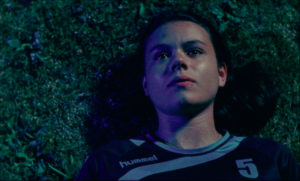
BRFF 2020 Short Film Review “See My Ghost Passing Away”
NO TRAILER CURRENTLY AVAILABLE
WATCH THE FILM HERE with all proceeds going to the filmmakers!
First, the Recap:
When you’re alone, and the shadows of the past come to your door, how do you react? Do you turn away in fear, hoping not to recall that which causes said shades to appear, do you choose to face them head-on with boldness and intent, or does it end up somewhere in between where they reside consistently in our soul? A young teenage girl, Lilith (Lilith Grasmug) attempts to engage with her teammates and the game they play. But, once the practice is over and everyone heads their separate ways, Lilith finds herself alone, caught up in the memories and often conversations associated with a loss she cannot quite let go of while making the painful efforts to cherish what was most valuable about it all–love.
Next, my Mind:
Reconciling loss, love, reminiscing, and the hurt that accompanies heartbreak over no longer having a special someone close or present provides the tangible and palpable thematic foundations in this 12-minute short film project from writer/director/producer Yann Pichot and producer/DP Charles-Hubert Morin, doing so in such a manner as to evoke strong yet quietly emotional gravitas through its narrative about one girl’s tragic loss and how she finds herself contemplating and managing it all. It is another among the 32 short films being offered at the 2020 Berlin Revolution Film Festival.
The overall exploration here is assuredly found in many a film. Yet, once again, indie cinema creates an atmosphere of more believable and completely grounded aesthetics via a presentation that this critic feels here goes well beyond most mainstream efforts, choosing not to overcomplicate the story with unnecessary dialogue or overblown orations of lament, but rather utilizing its imagery alone as the primary source of moving the tale forward and expressing through its primary character the unsettled state she finds herself battling when confronting what she’s lost.
When there is conversation, it is brief and to the point, once more having its points driven home by the visuals, emphasizing exactly how deep such absence can affect someone, especially when involving the feelings towards that individual that are being portrayed and by conjecture expounded on. It tells of us as the emotional beings we are created to be, while also not shrinking away from the actualities in these situations of wanting to be anywhere else but the present, even desiring to be something else entirely as an escape from the internal suffering.
How this is pictured is likewise kept very straightforward, showing both the dreamlike qualities in wanting to regain the touch, the connection, the yearning felt from being with that someone to the equally disturbing nightmares that can also come from the strife in spirit and soul being experienced. The ghost imagery is varied as well, mainly in two forms, that also emphasize this dichotomy. Ultimately as one would potentially expect, the film’s ending leaves things in an open status for Lilith, and I very much feel this is smart, calculated direction to take it, since let’s face it, this kind of hurt doesn’t just go away immediate no matter to what degree we might finally let go.
Grasmug, having to portray so many levels of this character’s struggles without saying a word, does a wonderful job doing so, allowing the actions and reactions to her perceived partner’s presence guide us through Lilith’s turbulent and more serene times, all while selling us completely on the fact that the pain being endured is tearing her apart yet in certain ways becomes the conduit for what we hope will become future healing and freedom from the loss. Grasmug displays this journey in the character with very understated but poignant measure that successfully draws us as the viewer into Lilith’s sadness and emotional desolation, yet leaves us as well with that hope she will find peace.
Other than a brief sequence at the film’s start where we see appearances by additional actresses playing Lilith’s sports teammates, the only other primary player here comes from Lisha Pu as Lisha, Lilith’s love who has apparently suffered an unknown fate and whose ghost now haunts her still-Earth bound partner’s thoughts. There’s an intentionality in the way Pu pulls this off in order to ensure the ghost is a viable and directly impactful part of the film’s grander purposes, and in the short times of spoken words for this character, it’s done with a nicely executed calm that totally fits the spectral force that Lisha is. Pu does a lot with a little here, which is a credit to her.
In total, “See My Ghost Passing Away” addresses loss in a common yet no less powerful way, perhaps bringing a more potent and stirring air to it thanks to its mostly words-free presentation. It calls us to realize that in our times of loss, it’s more than important to mourn, grieve, and feel the void left by someone we love no longer being there, but to also embrace the fact that we do need to find that fortitude to move on, knowing it isn’t just what WE need to do, but that it’s what THEY would wish for us as well.
As always, this is all for your consideration and comment. Until next time, thank you for reading!





